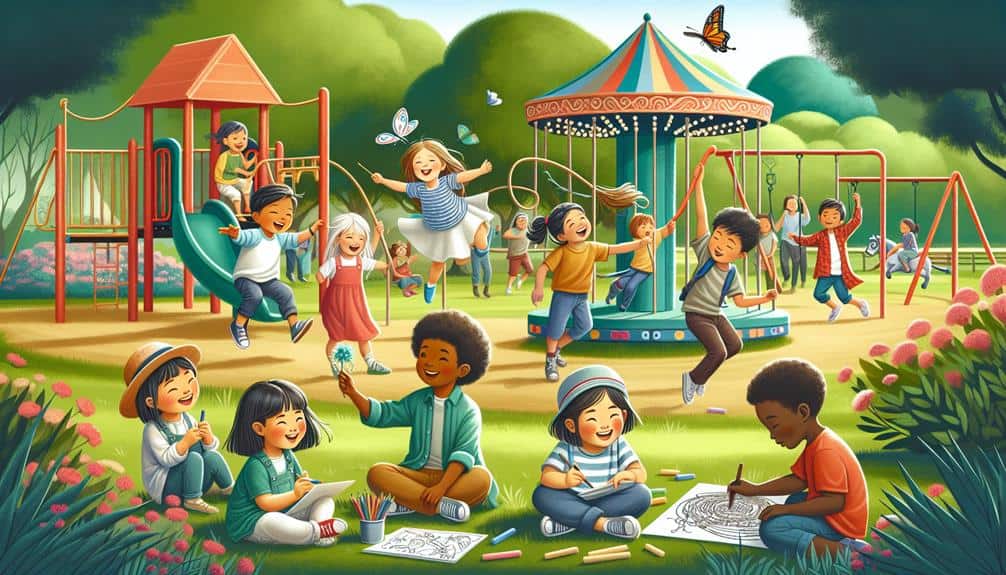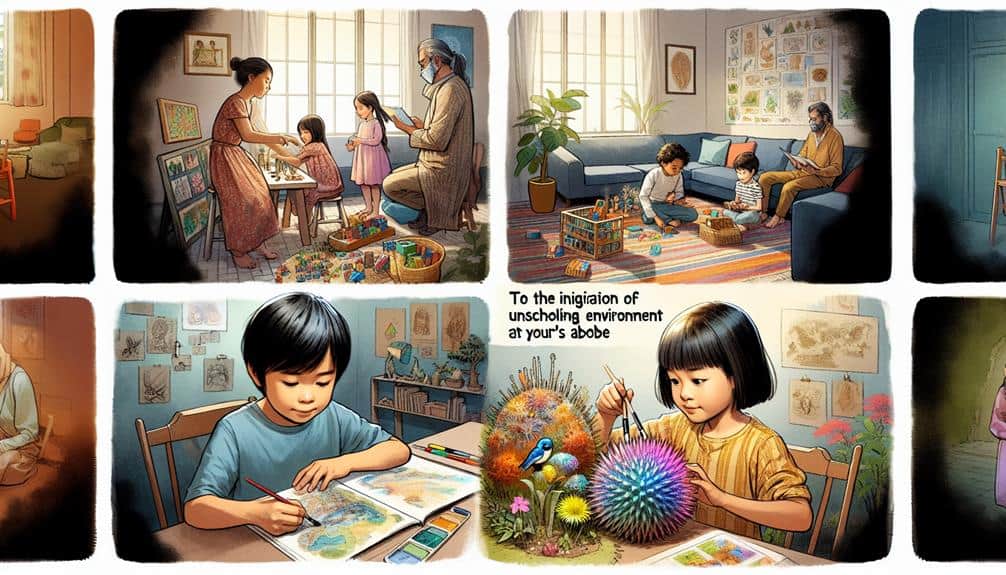Engage in socialization to foster holistic development and peer support in unschooling. Interaction with peers enhances social skills, idea exchange, and creates a supportive learning environment. Community involvement broadens perspectives, instills responsibility, and provides diverse educational experiences. Participating in co-ops, extracurricular activities, and networking enhances collaborative learning, resource sharing, and idea exchange. Balancing socialization with autonomy enriches educational journeys for unschoolers. Further exploration reveals the depth of benefits socialization offers in unschooling.
Key Points
- Socialization opportunities in unschooling foster essential social skills.
- Peer interactions provide support, camaraderie, and idea exchange.
- Community engagement broadens perspectives and nurtures holistic development.
- Group learning in co-op settings enhances teamwork and communication skills.
- Extracurricular activities promote personal growth and diverse learning experiences.
Benefits of Socialization in Unschooling
Engaging in socialization opportunities in unschooling fosters diverse interactions that nurture holistic development in learners. Peer support plays an important role in providing a sense of belonging and camaraderie for unschoolers. Interacting with peers allows learners to exchange ideas, collaborate on projects, and develop essential social skills such as communication and teamwork.
This peer-to-peer interaction fosters a supportive environment where individuals can learn from one another and grow together.
Community engagement is another key aspect of socialization in unschooling. By participating in community activities, learners have the opportunity to interact with individuals of different ages, backgrounds, and experiences. This exposure to a diverse range of people helps broaden their perspectives and enhances their understanding of the world around them.
Community engagement also allows unschoolers to contribute positively to society, fostering a sense of responsibility and citizenship.
Community Involvement and Unschooling
Community involvement plays an essential role in unschooling. It provides social events benefits and group learning advantages. By engaging with local communities, unschooled individuals have the opportunity to participate in a variety of activities that foster socialization and collaboration.
This involvement not only enhances their social skills but also broadens their knowledge through shared experiences with diverse groups.
Social Events Benefits
Participating in social events within a community setting can greatly enhance the socialization opportunities available to unschooling families. Social events provide a platform for unschoolers to interact with a diverse group of individuals, fostering important social skills and building relationships. Here are some key benefits of engaging in social events and group outings:
- Diversity: Social events expose unschooling families to a wide range of people from different backgrounds, ages, and cultures, promoting a broader understanding of society.
- Social Skills Development: Interacting with others in a social setting helps unschooled children develop essential social skills like communication, empathy, and teamwork.
- Community Connection: Engaging in group outings allows unschooling families to establish connections within the community, leading to potential friendships, support networks, and collaborative learning opportunities.
Group Learning Advantages
Group learning in the context of unschooling involves collaborative educational experiences within the community that offer unique advantages for children's development and socialization. Engaging in group projects provides unschooled children with opportunities to enhance their teamwork skills, problem-solving abilities, and creativity. Through collaborative efforts, children learn to communicate effectively, respect diverse opinions, and negotiate differences, fostering valuable social skills essential for their future interactions.
Participating in group projects also promotes team building among unschooled children. By working together towards a common goal, children learn the importance of cooperation, leadership, and delegation of tasks. These experiences empower children to appreciate the strengths of each team member, leading to a sense of camaraderie and mutual support.
Additionally, engaging in group learning activities allows unschooled children to learn from their peers, gaining new perspectives and insights that contribute to their overall educational development.
Social Skills Development in Unschooling
Developing social skills in unschooling involves engaging in varied real-life situations that foster communication, collaboration, and empathy.
- Diverse Interactions: Unschoolers interact with individuals of various ages, backgrounds, and interests, enhancing their ability to communicate effectively in different settings.
- Real-world Problem Solving: Through peer interactions, unschooled children learn to collaborate, negotiate, and resolve conflicts, which are essential skills for maneuvering social situations in adulthood.
- Empathy Building: By engaging in unstructured social settings, unschoolers develop empathy by understanding diverse perspectives, recognizing emotions in others, and responding with sensitivity.
Research suggests that unschooled children often exhibit strong social skills due to the emphasis on real-world interactions and the freedom to engage authentically with others.
Peer interactions play a significant role in fostering social development, allowing unschoolers to learn from each other, practice effective communication, and build meaningful relationships based on mutual respect and understanding.
Unschooling Co-op Opportunities
Unschooling co-op opportunities offer a vital learning environment for students to engage in shared educational experiences beyond traditional classroom settings. These co-op collaborations bring together homeschooling families to pool resources, knowledge, and skills, fostering a diverse and dynamic educational setting.
By participating in co-op activities, unschoolers can benefit from a community of peers with varied interests and expertise, creating a rich learning environment.
Community partnerships play an important role in the success of unschooling co-ops. These partnerships allow unschooling families to access a wider range of resources, such as specialized classes, field trips, and guest speakers.
Extracurricular Activities for Unschoolers
Exploring a variety of extracurricular activities can further enrich the educational experiences of unschoolers by providing opportunities for hands-on learning and skill development outside of traditional academic settings. Engaging in extracurricular activities such as community service, joining sports teams, and participating in specialized clubs can offer unschoolers unique learning opportunities and avenues for personal growth.
- Community Service: Involvement in community service projects allows unschoolers to develop empathy, social responsibility, and practical skills while making a positive impact on their communities.
- Sports Teams: Joining sports teams not only promotes physical health and teamwork but also fosters discipline, goal-setting, and resilience in unschoolers.
- Specialized Clubs: Participating in clubs tailored to specific interests like coding, art, or music can deepen unschoolers' knowledge in these areas, foster creativity, and provide opportunities for collaboration with like-minded peers.
Through diverse extracurricular activities, unschoolers can cultivate a well-rounded skill set, build meaningful relationships, and broaden their horizons beyond traditional academics.
Networking for Unschooling Families
You can benefit greatly from networking within the unschooling community.
Building connections with other unschooling families allows for the exchange of valuable resources and ideas.
Building Community Connections
By actively engaging with local homeschooling groups and educational cooperatives, unschooling families can cultivate valuable community connections that provide enriching socialization opportunities for their children. These connections offer a supportive network where parents can share experiences, resources, and ideas, ultimately enhancing the unschooling journey for both parents and children.
Here are some ways in which building community connections can benefit unschooling families:
- Diverse Perspectives: Interacting with a variety of families from different backgrounds through local meetups can expose your child to diverse perspectives and experiences, broadening their understanding of the world.
- Collaborative Learning: Parent involvement in community events fosters collaborative learning environments where children can engage in group activities, projects, and discussions, promoting critical thinking and social skills.
- Resource Sharing: Establishing strong community connections allows for the sharing of educational resources, materials, and expertise, creating a supportive ecosystem for unschooling families to thrive.
Sharing Resources and Ideas
Engaging in networking opportunities allows unschooling families to share valuable resources and exchange innovative ideas within a supportive community framework. Resource sharing and collaboration are vital aspects of unschooling, where families can pool together a variety of educational materials, tools, and experiences. Through networking, unschooling parents can access a wealth of resources that they may not have been able to acquire individually, enhancing the learning opportunities for their children.
Moreover, idea exchange and networking foster a dynamic environment where different perspectives and approaches to unschooling can be discussed and explored. By connecting with other unschooling families, individuals can gather insights, strategies, and creative teaching methods that have proven successful in diverse settings. This exchange of ideas not only enriches the unschooling experience but also encourages continuous growth and development within the community.
In essence, networking for unschooling families goes beyond mere socialization; it serves as a platform for resource sharing, collaboration, and idea exchange, elevating the educational journey for both parents and children.
Enhancing Learning Experiences
Networking within the unschooling community not only facilitates resource sharing and idea exchange but also plays a pivotal role in enhancing the learning experiences for families and children involved. Through connecting with other unschooling families, you open up a world of opportunities that can greatly enrich your educational journey.
Here's how networking can enhance your learning experiences:
- Field Trips: By networking with other unschooling families, you can organize and participate in field trips to museums, nature reserves, historical sites, and more. These hands-on experiences provide valuable real-world learning opportunities for your children.
- Playdates: Setting up playdates with other unschooling families allows children to engage in social interactions, develop communication skills, and learn through play in a supportive environment.
- Resource Sharing: Networking enables the sharing of resources such as books, educational materials, and online resources, expanding the scope of learning possibilities for both parents and children.
Balancing Socialization and Autonomy
Finding a balance between fostering socialization opportunities and promoting autonomy is a key consideration in the unschooling approach. Unschooling parents face the challenge of ensuring their children have adequate social interactions while also respecting their autonomy in choosing how to engage with others.
Balancing socialization and autonomy can be achieved through community engagement, allowing unschooled children to interact with peers in various settings while still maintaining control over their own learning journey.
Socialization challenges may arise when unschooled children have limited exposure to diverse social environments, potentially hindering their ability to develop essential social skills. On the other hand, autonomy struggles can occur if children feel pressured to socialize in ways that don't align with their interests or comfort levels.
Frequently Asked Questions
How Can Unschoolers Find Socialization Opportunities in Rural Areas?
To find socialization opportunities in rural areas, you can connect with local community events, homeschool groups, and online forums. Additionally, consider seeking out pen pals to build relationships beyond physical proximity, fostering social interactions.
Are There Specific Resources for Unschoolers With Social Anxiety?
Feeling like social anxiety is a mountain you can't conquer? Fear not! Explore a world of resources tailored for unschoolers like you. Discover support groups and therapy options to help you overcome your fears.
What Role Do Grandparents Play in Unschoolers' Socialization?
In unschooling, grandparents can contribute meaningfully to socialization through community involvement, support groups, and participation in online forums or virtual meetups. Their diverse experiences and perspectives enrich the unschoolers' learning journey and foster meaningful connections.
Can Unschoolers Participate in Standardized Social Activities Like Prom?
Unschoolers can participate in standardized social activities like proms through virtual proms or community events. These opportunities provide a chance to engage with peers in a more structured setting, fostering social skills and creating memorable experiences.
How Do Unschooling Families Handle Conflicts Within Social Groups?
When handling conflicts within social groups, unschooling families approach conflict resolution through open communication and fostering empathy. Encouraging constructive peer interactions and teaching problem-solving skills empowers children to navigate social challenges effectively and cultivate positive relationships.



